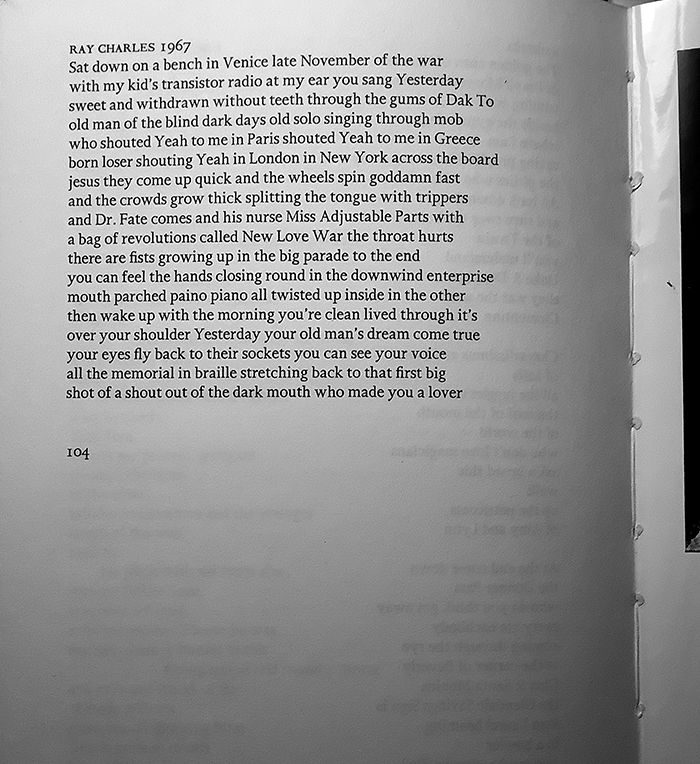in progress
process books
(from syllabus, at seminar canvas page
deliverables (by students)
- a body of work and the experience that comes with it, that needn’t be seamlessly packaged together; and
- a process book, that documents one’s processes, experiments, trials and errors, changes in approach and thinking.
Your process book documents how you moved from Point A through points B, C and D; what you encountered along the way; what changed; and your understanding and assessment of your own process. Someone looking at your process book, ten years hence, should be able to understand what you did, what your aims, changing aims, and outcomes were. (They’re a gift to someone in the future, including yourself.)
Process books going back some 20 years are contained in the gray archival boxes (and 3-ring binders for earlier years, in the file cabinet in studio area). See the directory of those projects at studio.montserrat.edu/gd/405/index.htm; also available in green three-ring binder on table at right of crit wall.
The process book may (or may not, depending!) be used as a kind of test bed for approaches to bringing aspects of your work together — with a view to next semester.
Thursday, intense
during seminar, and in its aftermath, a few things came up; listed below, in no particular order. (I am grateful for such days.)
substitutions, of images within separate image structures. This related to Brooke’s airplane in sky (in NASA envelope address window)... John showed some Wallace Berman (1926-1976) “verifax” (early photocopying method) collages, involving a transistor radio.
examples:
here
artnet, and
Jack Hirschman’s Black Alephs : Poems 1960-1968 (Phoenix Bookshop in Association with Trigram Press, 1969); I will bring my copy (of this much-loved book) in on Tuesday. Details from one spread (page 104, and facing collage), from my copy, below.
much about Wallace Berman at this Kohn Gallery page, and of course there’s wikipedia.
“A woman needs a man like a fish needs a bicycle”
a phrase to know, and its background to know too —
www.phrases.org.uk/meanings/a-woman-needs-a-man-like-a-fish-needs-a-bicycle.html
“Mess is why we’re here.” (Eimear McBride)...
The reader of Girl has no cover. There is nowhere for her or him to go other than inside the narrator’s thoughts. The Lesser Bohemians is suggesting on the other hand that in order to survive, you must be more than one. Unlike the continuous present of Girl, the protagonists of The Lesser Bohemians arrive at something like a moment of truth when ‘The past sits forward and the cold comes pouring in.’ They have each been warding off this moment for their own reasons but it marks the shift between the casual sex they had been enjoying and not enjoying up until then, and their full-blown love affair. This, we could say, is the unconscious contract between them (as indeed between many couples). It is what they have been gearing up for – and what the reader has been primed to expect – from the start: ‘Mess is why we’re here.’ ‘How were you fucked up? Let me count the ways!’
the above from Jacqueline Rose, “From the Inside Out,” being her review of Eimear McBride, The Lesser Bohemians (2016), in the London Review of Books 38:18 (22 September 2016) :
https://www.lrb.co.uk/the-paper/v38/n18/jacqueline-rose/from-the-inside-out (paywall, pdf at seminar google drive)
a review, and two interviews —
The Lesser Bohemians by Eimear McBride review – a brilliant evocation of sex and intimacy
Lara Feigel. The Guardian. 20 September 2016
https://www.theguardian.com/books/2016/sep/02/the-lesser-bohemians-by-eimear-mcbride-review
Eimear McBride: ‘Women are really angry. I feel a deep, burning sense of injustice at the way women are treated’
Lisa Allardice. The Guardian. 24 January 2020
https://www.theguardian.com/books/2020/jan/24/eimear-mcbride-women-are-really-angry
Eimear McBride: ‘Women grapple with shame because we’re held to a higher standard’
Rachel Cooke. The Guardian. 1 August 2021
https://www.theguardian.com/books/2021/aug/01/eimear-mcbride-women-grapple-with-shame-because-were-held-to-a-higher-standard
parents
This Be The Verse
by Philip Larkin
They fuck you up, your mum and dad.
They may not mean to, but they do.
They fill you with the faults they had
And add some extra, just for you.
But they were fucked up in their turn
By fools in old-style hats and coats,
Who half the time were soppy-stern
And half at one another’s throats.
Man hands on misery to man.
It deepens like a coastal shelf.
Get out as early as you can,
And don’t have any kids yourself.
from Collected Poems (Farrar Straus and Giroux, 2001)
Poetry Foundation
the language of flowers
something to know about. came up in discussion of Melissa’s shattered wallpaper collages, with their violets and coneflowers —
violets —
A white violet meant “innocence” while a purple violet would symbolize that the giver's “thoughts were occupied with love” about the recipient.
google
coneflowers —
In the language of flowers, the purple coneflower denotes skill and resilience – strength and health. Echinacea has a long history in...
google
lots at wikipedia, and many elsewheres.
Laurie Anderson, Norton Lectures / Spending the War Without You
All six of Laurie Anderson’s Norton Lectures will be permanently available on the Mahindra Humanities Center website and YouTube channel starting on Wednesday, December 15.
Lecture 1 : The River (February 10, 2021)
Lecture 2 : The Forest (March 24, 2021)
Lecture 3 : Rocks (April 14, 2021)
Lecture 4 : The Road (October 6, 2021)
Lecture 5 : The City (November 10, 2021)
Lecture 6 : Birds (December 8, 2021)


No comments:
Post a Comment